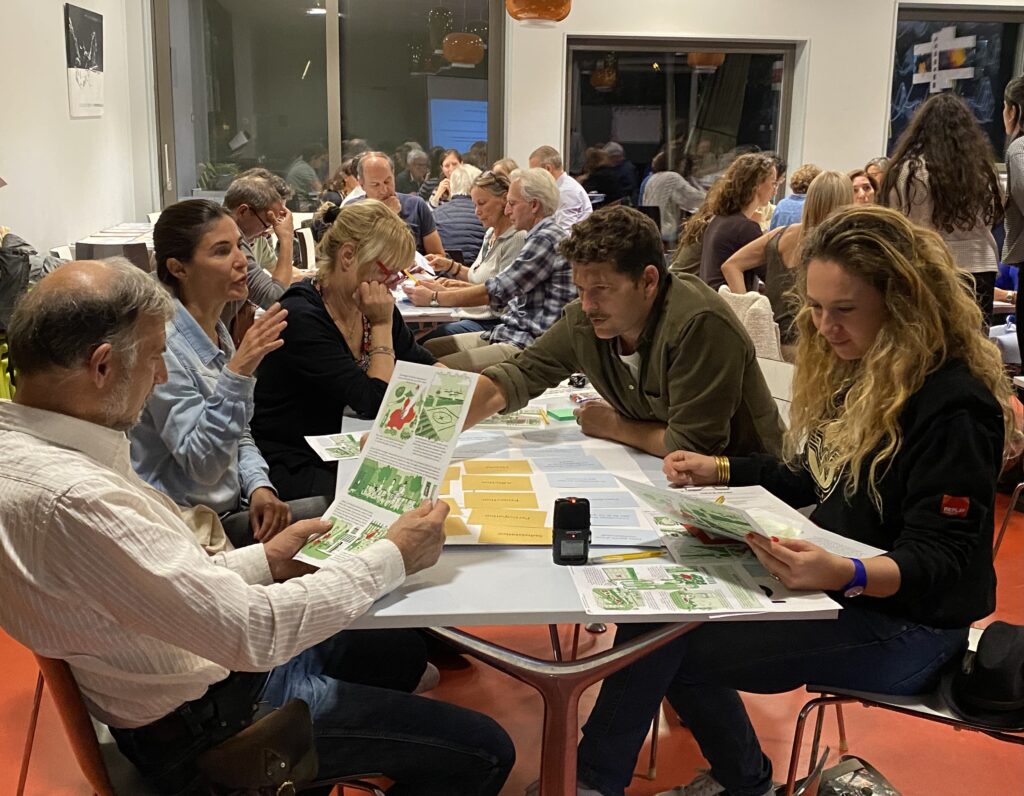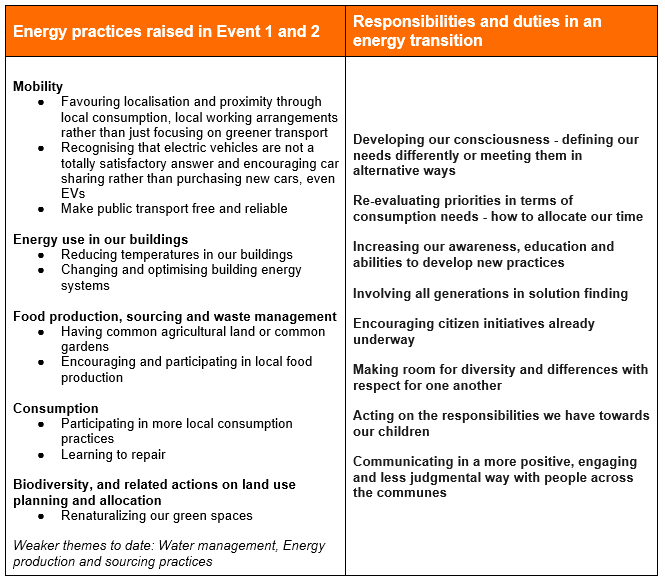Date and Place: 19 October 2022
Our second event in the DIALOGUES citizen forum welcomed more than thirty residents to Restaurant le Tilleul, Meinier for a 2-hour discussion centred on what it means to live well in an energy transition. The evening was structured as a participatory workshop designed by the team members of the WEFEL : Wellbeing, Energy Futures and Everyday life project.
After a warm welcome by Madame Coranda Pierrehumbert, Mayor’s office, Meinier Commune, we launched directly into the workshop purpose: to discuss whether and in what way an energy transition represents the good life, and what needs to be changed today so that we can achieve sustainable well-being for all in the future.
The workshop introduces five cartoon characters to help participants imagine living a good life in Geneva in 2035, representing energy efficiency, sufficiency and renewable energy measures. Each character explores a particular domain relevant to everyday life consumption, such as living and working, preparing a meal, or getting around.

We often talk about changes in energy consumption and production in terms of what we must give up or lose. This can be unhelpful and sometimes even counterproductive. The premise of this workshop is that if we take human needs as our starting point, we can come up with nuanced and positive thinking about the role of energy as a means to meet those needs. We can explore what needs might not be met, regardless of the energy we use. For example, information and communication technologies can hinder our ability to have meaningful relationships, even though they help us connect virtually with people around the world. How can we aim to meet more needs, such as the need for social connection, while using energy more efficiently or less? The changes required to make energy transitions could allow us to create positive personal and community outcomes.
The workshop format allowed participants to imagine what energy citizenship could look like as part of a good life while learning more about the barriers and incentives to developing new energy practices.

Our participating residents created 6 small groups to discuss these ideas, with one cartoon character discussed per table. First, they introduced themselves, and then read a comic together. Then they discussed the comic characters and whether or not they thought the personas represented a good life where needs were being met in their particular experience of the energy transition. After a break for the aperitif, the groups came back together again to discuss what changes they think are needed for an energy transition to take place that accounts for the normative aim of living well. Finally, the groups shared their thoughts on what collective changes could ensure well-being in the energy transition in an open discussion altogether.
Each table developed its own narrative based on its comic characters and themes, personal experiences, opinions and understanding of the exercise. Across the tables, the following elements seem to be important to ensuring well-being in the energy transition in Meinier and surrounding communes:
Securing human needs and energy transitioning are complex subjects. It would be untrue and unfair to suggest that agreements are easy to reach and that no trade-offs exist. Local residents came across many tensions in their discussions. Other tensions were heard when listening across all discussions. Three of the most striking were:
The European DIALOGUES project in Geneva aims to help residents to define what energy citizenship means in the communes of Vandœuvres, Collonge-Bellerive, Choulex and Meinier over the next 5 months. Our first topic of discussion in September was the current challenges and opportunities for citizen participation in the energy transition in Geneva: The main themes that came out were the importance of finding time, the need to enforce social cohesion, and the significance of solidarity, which includes respect for diversity. This second event gave insight into what energy citizenship means in terms of meeting our needs and the needs of others.

We also heard views about how to realise these new energy practices. Participants from Event #1 focused on the desire for social connection and collaboration between all actors, both political and non-political, while participants from Event #2 placed a strong emphasis on structural changes and changes at bigger scales rather than individuals making practice changes. The framing of the workshop may have contributed to this, but participants also seemed convinced of the need for changes at the level of societies and economies being the key to widespread change.
Some preliminary suggestions for changes needed before energy transitions can be fully realised included:
The third of four discussion events will take place towards the end of November. Our topic is highly relevant to the winter ahead, as well as the deeper changes that are starting to take place in our energy systems here in Switzerland: Energy in our buildings: chosen or imposed sufficiency?
For more information, have a look here.
Would you like to participate? Write to us at projetdialogues@unige.ch
Dr. Louise Gallagher
Département de sociologie | Université de Genève